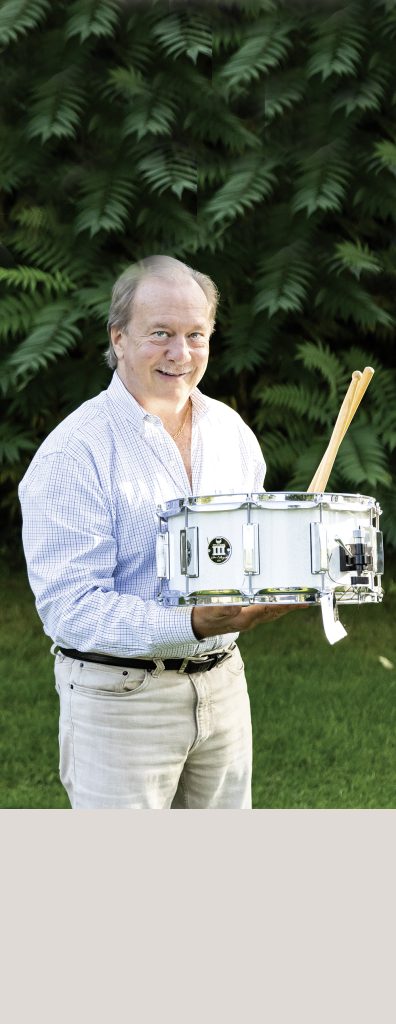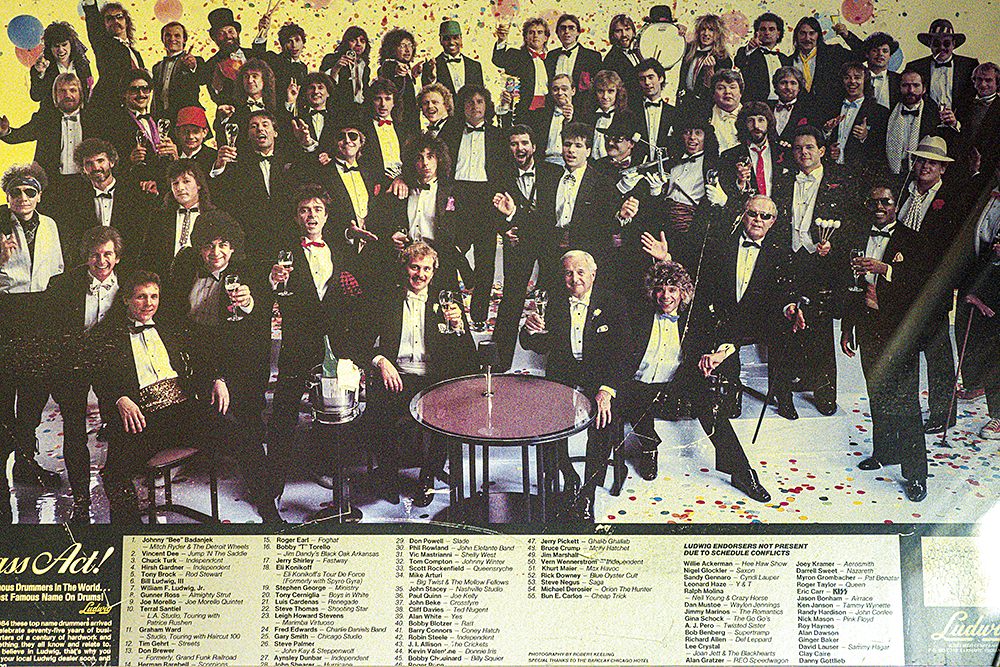Downers Grove’s Bill Ludwig continues his family’s legacy in the drum business

BY VALERIE HARDY
William F. Ludwig III quite literally marches to the beat of his own drum. Known as Bill or B3, Ludwig proudly wears the title of third-generation drum-maker.
Ludwig’s grandfather, William F. Ludwig Sr. (nicknamed “Senior”), played the drums in a circus and toured with a vaudeville act during the offseason. Vaudeville music was faster than the music he played previously, and “he could barely keep time with it using the wooden footboard and beater available,” Ludwig said.
With the goal of increasing ease and speed of drumming, in 1909, Senior and his brother, Theobald, began Ludwig & Ludwig out of their garage. They invented a bass drum pedal that folded, “which was unheard of at the time,” Ludwig explained, and it became the company’s first major product. As business increased, Ludwig & Ludwig moved to a small shop, added tuning and repairing drums to their repertoire, and became “the go-to guys. If you had a problem with your drums, you’d go see the Ludwig brothers,” Ludwig said.
Senior also invented a foot-tuner for the timpani, which is still patented today. “Grandpa was a drummer and an inventive guy, so he kept making things he needed and wanted and others needed and wanted,” Ludwig said, including cutting-edge drums.
When Theobald died during the 1918 flu epidemic, Senior renamed the business Ludwig Drum Company. This was during the silent film era, and Senior used his drums to make sound effects such as gunshots to enhance the moviegoing experience. However, the advent of “talkie” films and the subsequent Great Depression took a toll on drumming and drum manufacturing.
In 1930, Senior made the difficult decision to sell his beloved business. He continued to work for the business, but he did not always agree with “the corporate types,” Ludwig said.
Senior co-founded a new company, WFL Drum Co., with his son and namesake William F. Ludwig II in 1937. The company went “from the basement of a corner building to the next floor, and the next floor, then the whole building, then the building next door,” Ludwig said of the business’s growth.
Already the leading drum company at the time, the family’s business peaked in the 1960s after The Beatles’ Ringo Starr played a drum kit branded with the Ludwig name on the Ed Sullivan Show. In an online video, Starr explained how he procured his first Ludwig drums from a store in London, and the large Ludwig label was almost removed. He asked for it to be left on though, because he “loved anything American.”
Starr thought the “sound was great,” too, and with his and other popular artists’ endorsements, the Ludwigs’ business boomed for years, and Ludwig had a front row seat. “I started working for the company in third grade,” Ludwig, a 1973 graduate of Downers Grove North High School, said.
Following in his father and grandfather’s footsteps, Ludwig played percussion. When Herrick Junior High School’s band director called roll on the first day of school and asked, “Ludwig – as in the drums?” Ludwig answered affirmatively. The director assigned him to play the timpani, even though he had previously played bass drums.
Ludwig continued drumming in Downers Grove North’s symphonic, wind ensemble, and marching bands and in numerous local 4th of July parades. Each summer, teenaged Ludwig worked in a different department at the company, and he was hired on in earnest after college. “I was never pushed into [the family business],” Ludwig said. “I did it because I loved it.”
Ludwig’s father named him marketing manager and head of artist relations. He built up an impressive roster of endorsers, including Led Zeppelin and Aerosmith. When tasked with identifying a line-up of four top endorsers for an upcoming advertising campaign, Ludwig thought to himself, “I assembled quite a stable of stars.”
The “stable of stars” phrase kept running through Ludwig’s mind, and it became the first of five biennial thematic photoshoots for which he invited over 20 of the brand’s top musicians to convene in Chicago. Shot in 1977 in front of a barn, the final image included the headline, “Ludwig’s Stable of Stars Doesn’t Horse Around!” The musicians, including four who traveled from Europe, paid for their own flights, a true testament to the Ludwigs and their custom crafted instruments.
The fourth photoshoot marked the company’s 75th anniversary, and its theme was “Class Act.” A number of jazz drummers joined the usual line-up of rock drummers, totaling more than 50 musicians pictured. All wore tuxedos and raised glasses of champagne. “People were astonished that I had that many bands of stature,” Ludwig said.
Ludwig began inviting roadies as well, and he brought his company’s sound engineers. “They started talking to each other, which was really beneficial,” Ludwig said, highlighting the outcome of finessing product designs accordingly.
In 1981, the Ludwigs once again sold their business. Ludwig worked in other industries, until he encountered a photo of his grandfather, on the back of which was written, “Senior starting over.” Senior had been 59 in the photo, the same age Ludwig was at the time. Having considered reentering the drum business for a while, Ludwig interpreted the photo as a sign.
History repeating itself, Ludwig opened WFLIII Drums in 2014. A Kansas-based vintage Ludwig drum collector and investment banker offered to help finance the new business, and Ludwig decided to headquarter WFLIII in Kansas due to “the central location for shipping raw materials and goods.”
Charlie Watts of the Rolling Stones requested one of WFLIII Drums’ inaugural wooden snare drums, and Ludwig hand-delivered it to Watts where he was performing in Ohio. Starr received the first aluminum snare drum produced under Ludwig’s new brand.
“I just went back to the basics, and it’s working,” Ludwig said of WFLIII’s production approach. “I make drums using the thinnest 6-ply shell, the way my grandfather did, but with modern-day technologies.”
Visit wfliiidrums.com to learn more about the Ludwig family and WFLIII products and events.

In the 1970s and 1980s, Bill Ludwig coordinated five biennial thematic photo shoots, including this one, featuring world-renowned drummers who were loyal to his family’s brand.
